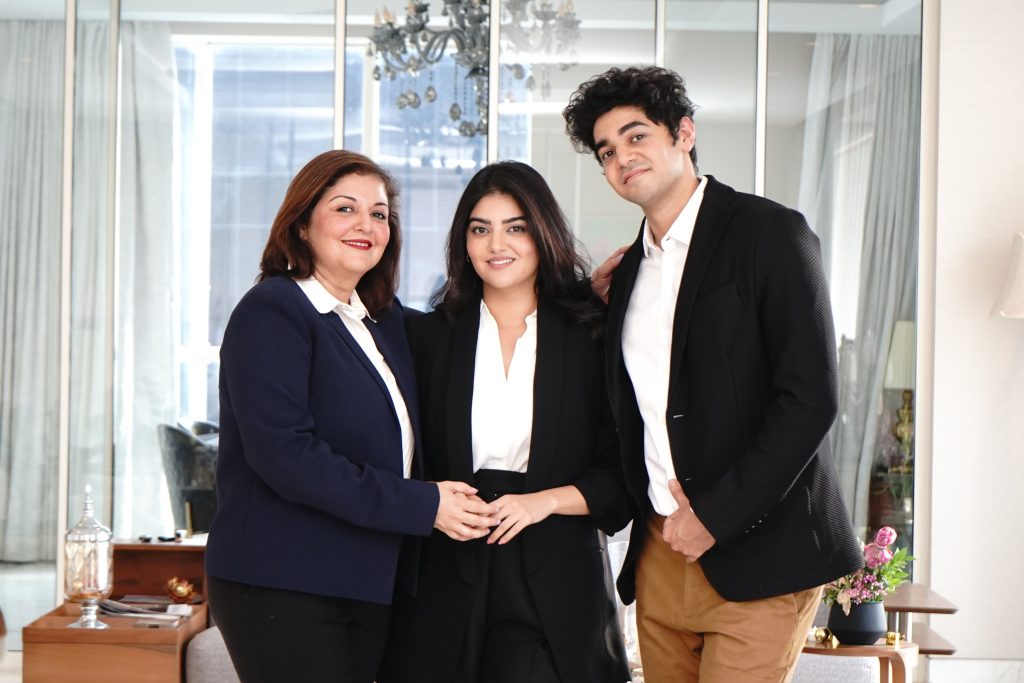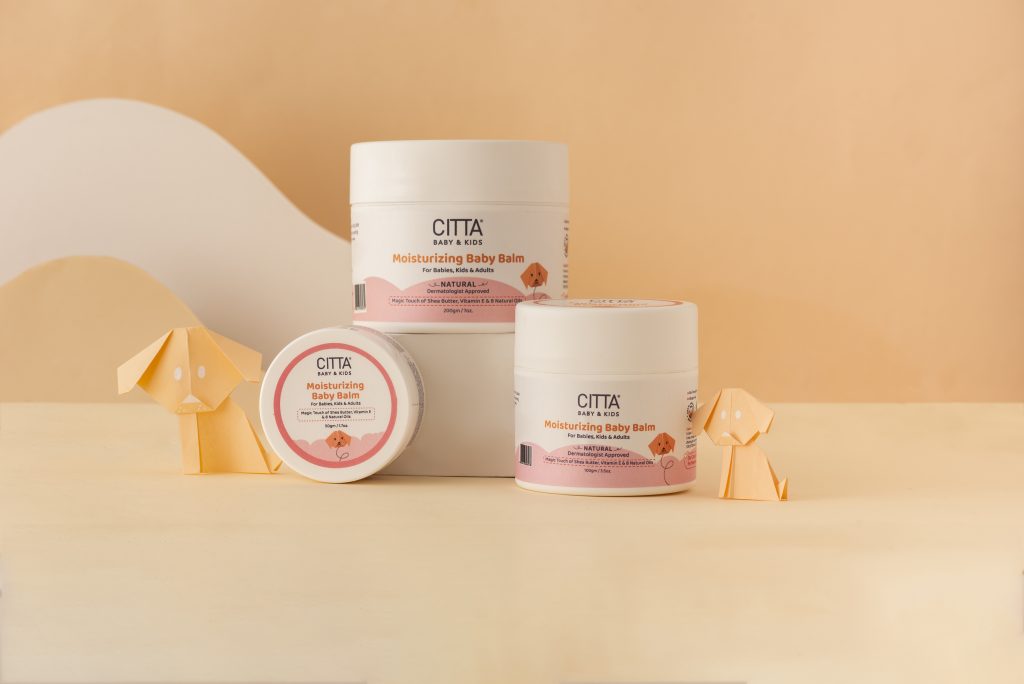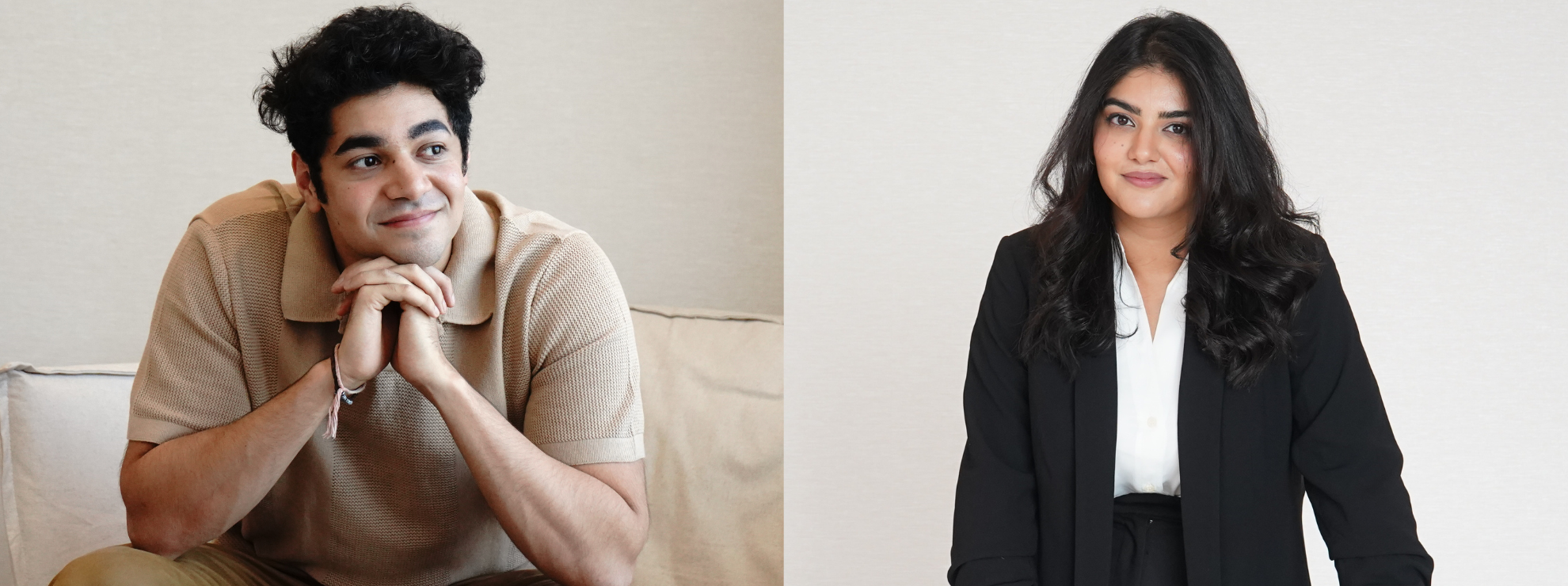(February 21, 2024) The baby care industry in India has seen significant growth over the last few years, driven by increased consumer awareness rising disposable incomes, and is anticipated to expand at a CAGR of 14.02 percent from 2022 to 2027. Parents want safe, natural and cruelty-free products for their babies, as overall trends move towards healthier, more sustainable lifestyles. Indian brands have risen to the challenge, bringing modern innovation together with a deep understanding of local and cultural nuances, and India’s age-old traditional remedies. CITTA, co-founded by 24-year-old Akanksha Sharma, her mom, Monisha Sharma and brother, Tanay Sharma, is a Pune-based baby care brand that reached a turnover of Rs 1.2 crore within two years.

Akanksha and Tanay Sharma with their mother, Monisha
‘Nushke’ to building a brand
When Akanksha was studying in the US, her mom and grandma would call her all the time, lovingly giving her advice or ‘nushke’ like ‘drink turmeric milk,’ and ‘use rosewater when you’re out in the sun’. Around this time, a well-known baby care brand received a lot of bad press for using unsafe ingredients in their baby powder. Akanksha, who was always entrepreneurial, teamed up with her mom and brother to create a safer alternative, and CITTA came to be. Both siblings were abroad – Akanksha was studying Apparel Industry Management at the Fashion Institute of Design and Merchandising in LA, while Tanay was doing a Bachelor’s at the University of Toronto. Eventually, they returned home to build their business.
Business in their blood
“I was born and raised in a business family,” Akanksha tells Global Indian. “I have witnessed their struggles, growth and expansion. Entrepreneurship is in my blood. My parents are my biggest inspiration since I saw them during their struggling years and I see them now and all that they have accomplished. It pushes me to do better everyday.” A quiet and shy child, Akanksha grew into a confident young adult, going on to become head girl at Lexicon School in Pune, where she also participated in co-curricular activities, played basketball, volleyball, took part in debates, elocutions and lots more.
Akanksha and Tanay, who are currently 24 and 22 respectively, grew up in a joint family of 10 members where struggles were common in the early years. “I would see all the adults in my family work very hard till late. They made a decision to start a school together in which there were only 16 students in the first year, out of which three were me and my two sisters,” she says. Today, the school has 10,000 students, and holds a valuable lesson for Akanksha and Tanay. “Anything is possible with consistent hard work and dedication,” says Tanay. “It pushed me to do better. I got into the University of Toronto and did my undergrad there along with running my own small business.”
CITTA began with a mission to create safe and nurturing baby care products. As they researched the industry, they found it needed gentle but effective skincare solutions for both infants and their parents. They expanded into the skincare segment too, along with baby care products. “We are proud to be free from toxins, harsh chemicals, parabens, sulphates, silicones, talc, mineral oils, allergens, petroleum jelly and other potential irritants,” the duo say. “This ensures that are products are gentle on sensitive baby skin.” The CITTA product range includes a Moisturizing Baby Balm which uses eight natural oils, including Shea butter and vitamin E. Their talc-free baby oil is made with corn, oats and kaolin, which prevents rashes. Their foaming baby wash and baby shampoo are soap-free and tear-free.


Made for the Indian consumer
As homegrown baby care brands now flood the market, CITTA caters to the specific demands of the Indian consumer. “Whether it’s developing eco-friendly packaging, incorporating advanced technologies into our products or introducing unique formulations, we strive to set ourselves apart in a crowded market,” Akanksha and Tanay explain. They invest heavily in sustainability, ensuring that every part of the supply chain is rooted in integrity, from the ethical sourcing of raw materials to minimizing their carbon footprint every step of the way.
Building CITTA came with its share of challenges and successes. “Each contributed valuable lessons that will significantly shape our plans and strategies moving forward,” they say. There have also been numerous shifts in consumer preferences and lifestyles, which has taught them to invest more in R&D practices as they navigate the complexities of the global supply chain. “Disruptions brought about by external factors have emphasised the need for resilience and adaptability,” say the siblings. “We have learned to proactively diversify our sourcing strategies, build strategic partnerships and implement agile inventory management systems.” They are also working on enhancing their online presence, creating user-friendly interfaces and building robust e-commerce infrastructure.
The sibling journey
Akanksha and Tanay remain at the forefront of CITTA and use their sibling rapport to their advantage. “It’s fun and nice,” Akanksha smiles. “Tanay, as a brother and working partner, is always supportive. Whether in a meeting, during decision -making or facing any difficulties, you always know that there’s support from someone who is equally invested. Despite my emotional nature, Tanay is calm, so we complement each other.” Arguments are par for the course, but those are always sorted out in the end.
“Tanay agrees.”I had always pictured working with my sister when I was younger and I really like doing so because she gives me immense support and strength,” he smiles. “I get to be my goofy self around her and we get to laugh a lot together,” he laughs. They strike a balance by talking shop only at the office and just being siblings at home.
It’s a unique dynamic that has made for an exciting and fulfilling journey, bolstered by a deep understanding of each other and complementing one another’s strengths and shortcomings. “There is a natural synergy that goes beyond business – it’s a family affair infused with shared passion and dedication,” say the siblings. “We celebrate victories together, learn from setbacks and constantly push each other to innovate. It’s not just a partnership, it’s a shared adventure that makes every success even sweeter.”
- Follow Akanksha Sharma and CITTA on Instagram

